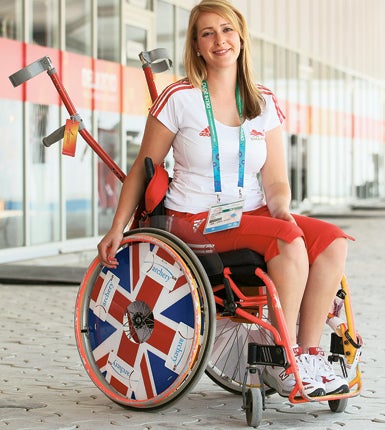Women's Olympic events cost less to see
London 2012 organisers accused of sex bias

Your support helps us to tell the story
From reproductive rights to climate change to Big Tech, The Independent is on the ground when the story is developing. Whether it's investigating the financials of Elon Musk's pro-Trump PAC or producing our latest documentary, 'The A Word', which shines a light on the American women fighting for reproductive rights, we know how important it is to parse out the facts from the messaging.
At such a critical moment in US history, we need reporters on the ground. Your donation allows us to keep sending journalists to speak to both sides of the story.
The Independent is trusted by Americans across the entire political spectrum. And unlike many other quality news outlets, we choose not to lock Americans out of our reporting and analysis with paywalls. We believe quality journalism should be available to everyone, paid for by those who can afford it.
Your support makes all the difference.The organisers of London's 2012 Olympics stand accused of undervaluing women's sports and contravening the Olympic Charter's commitments to equality by pricing tickets to some women's events well below the cost of their male equivalents. Some are going for less than half the price.
The Paralympic gold medallist Danielle Brown was among those who condemned the pricing for forcing female athletes to take a "back seat" and putting them on a par with disabled sportsmen and women.
Top tickets for the women's basketball final will cost £325 compared to £425 for the men's final, while boxing fans will be able to snap up the best seats for the women's final for £275, compared to £395. And if England makes the women's final, football fans keen to see England player Faye White (right) will pay £125, against £185 for the men''s final.
Sue Tibballs, chief executive of the Women's Sport and Fitness Foundation (WSFF), said: "There is no doubt it sends a clear message that women's sports are not valued equally. Lower price equals lower value. But this is not just a commercial event. A lot of public money has gone into it. Judgements are being made about the value of women's sport that don't reflect its value in the market: women's sport is at an all-time high."
While the success of female athletes such as cyclists Rebecca Romero and Victoria Pendleton has drawn attention to women's sport, it has had little commercial success.
A fundamental principle of the Olympic Charter is "to encourage and support the promotion of women in sport at all levels and in all structures with a view to implementing the principle of equality of men and women".
"We've got a national obligation to make it more than a commercial event," said Tessa Jowell, shadow Olympics minister. "But the London Organising Committee of the Olympic Games is a private company, and in the current economic climate, there is a pressure to balance budgets."
The International Olympic Committee (IOC) said yesterday that ticket pricing is a matter for the Games' organisers, who announced the prices of the available 8.8 million tickets on Friday. The pricing structure for the Olympics is complicated, and prices vary wildly. The best seats at the opening ceremony cost over £2,000, but 90 per cent of tickets cost £100 or less; children pay their age in pounds; the over-60s pay a £16 flat fee.
A London 2012 spokeswoman said: "The £2bn cost of putting on the Games is privately financed, and a quarter of that comes from ticket sales, so we've got to offer prices that people will pay."
Women's boxing tickets are thought to be set low to encourage spectators, as it's the first time female boxers will compete at the Games. The participation of NBA stars from the US is believed to have bumped up prices for the men's basketball.
London 2012 organisers said women's football simply did not have the same track record as the men's game when it comes to selling tickets.
Join our commenting forum
Join thought-provoking conversations, follow other Independent readers and see their replies
Comments